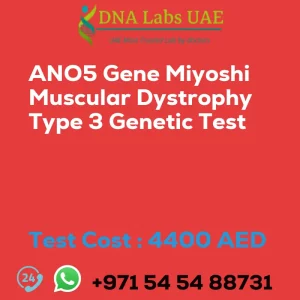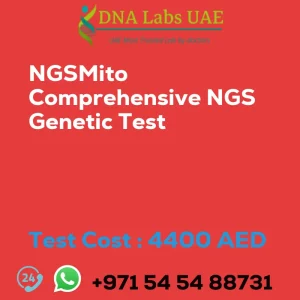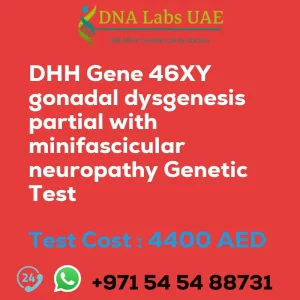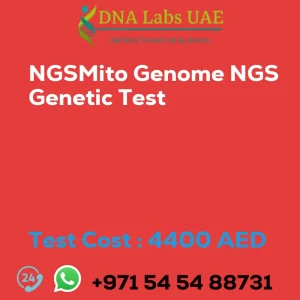TMEM70 Gene Mitochondrial Complex V ATP Synthase Deficiency Nuclear Type 2 Genetic Test
Components: TMEM70 Gene Mitochondrial Complex V ATP Synthase Deficiency Nuclear Type 2 Genetic Test
Price: 4400.0 AED
Sample Condition: Blood or Extracted DNA or One drop Blood on FTA Card
Report Delivery: 3 to 4 Weeks
Method: NGS Technology
Test Type: Neurological Disorders
Doctor: Neurologist
Test Department: Genetics
Pre Test Information: Clinical History of Patient who is going for TMEM70 Gene Mitochondrial Complex V (ATP synthase) deficiency, nuclear type 2 NGS Genetic DNA Test. A Genetic Counselling session to draw a pedigree chart of family members affected with TMEM70 Gene Mitochondrial Complex V (ATP synthase) deficiency, nuclear type 2.
TMEM70 gene mitochondrial complex V (ATP synthase) deficiency, nuclear type 2 is a genetic disorder that affects the function of ATP synthase, an enzyme complex involved in energy production within mitochondria. This disorder is caused by mutations in the TMEM70 gene, which is located in the nucleus of cells.
NGS (Next-Generation Sequencing) genetic testing is a type of genetic test that uses advanced sequencing technology to analyze multiple genes simultaneously. In the case of TMEM70 gene mitochondrial complex V deficiency, NGS genetic testing can identify mutations in the TMEM70 gene that may be responsible for the disorder.
NGS genetic testing is a powerful tool for diagnosing genetic disorders, as it can detect a wide range of genetic mutations in a relatively short period of time. This type of testing can help healthcare professionals provide an accurate diagnosis, determine the severity of the condition, and develop an appropriate treatment plan.
It is important to note that NGS genetic testing may not be available in all healthcare settings and may require specialized laboratories and expertise. Additionally, the specific genes analyzed in NGS panels can vary depending on the laboratory and the specific disorder being tested for. Therefore, it is recommended to consult with a healthcare professional or genetic counselor to determine the most appropriate testing options for a specific individual.
| Test Name | TMEM70 Gene Mitochondrial complex V ATP synthase deficiency nuclear type 2 Genetic Test |
|---|---|
| Components | |
| Price | 4400.0 AED |
| Sample Condition | Blood or Extracted DNA or One drop Blood on FTA Card o |
| Report Delivery | 3 to 4 Weeks |
| Method | NGS Technology |
| Test type | Neurological Disorders |
| Doctor | Neurologist |
| Test Department: | Genetics |
| Pre Test Information | Clinical History of Patient who is going for TMEM70 Gene Mitochondrial complex V (ATP synthase) deficiency, nuclear type 2 NGS Genetic DNA Test A Genetic Counselling session to draw a pedigree chart of family members affected with TMEM70 Gene Mitochondrial complex V (ATP synthase) deficiency, nuclear type 2 |
| Test Details |
TMEM70 gene mitochondrial complex V (ATP synthase) deficiency, nuclear type 2 is a genetic disorder that affects the function of ATP synthase, an enzyme complex involved in energy production within mitochondria. This disorder is caused by mutations in the TMEM70 gene, which is located in the nucleus of cells. NGS (Next-Generation Sequencing) genetic testing is a type of genetic test that uses advanced sequencing technology to analyze multiple genes simultaneously. In the case of TMEM70 gene mitochondrial complex V deficiency, NGS genetic testing can identify mutations in the TMEM70 gene that may be responsible for the disorder. NGS genetic testing is a powerful tool for diagnosing genetic disorders, as it can detect a wide range of genetic mutations in a relatively short period of time. This type of testing can help healthcare professionals provide an accurate diagnosis, determine the severity of the condition, and develop an appropriate treatment plan. It is important to note that NGS genetic testing may not be available in all healthcare settings and may require specialized laboratories and expertise. Additionally, the specific genes analyzed in NGS panels can vary depending on the laboratory and the specific disorder being tested for. Therefore, it is recommended to consult with a healthcare professional or genetic counselor to determine the most appropriate testing options for a specific individual. |








